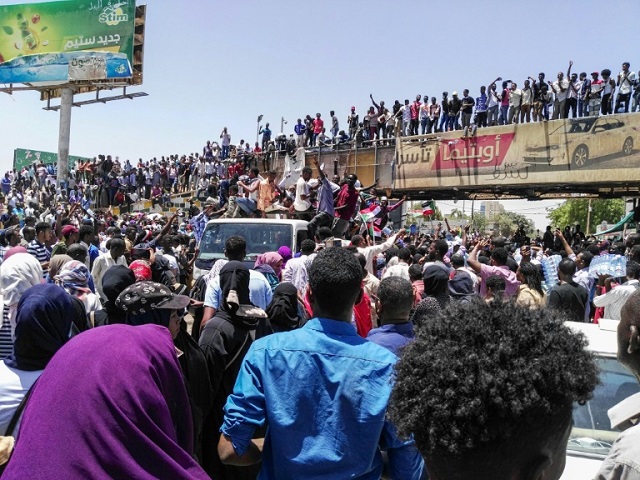
Khartoum, Sudan | AFP | Sudanese protesters on Tuesday called for a mass rally, insisting the army is not serious about handing power to civilians nearly three weeks after it toppled autocratic president Omar al-Bashir.
The call came as tensions mounted over the make-up of a new joint civilian-military council to run Sudan, with demonstrators reinforcing their barricades outside the army headquarters in the capital.
The two sides have been at odds over their representation in the council supposed to replace the military body that took power after Bashir’s ouster on April 11 in the face of mass protests against his three-decade rule.
The military has been pushing for a 10-member council including seven military representatives and three civilians.
The disagreements prompted the Alliance for Freedom and Change to announce a “million-strong march on May 2 to assert our main demand, which is for civilian rule”.
“The military council is not serious about handing over power to civilians,” said Mohamed Naji al-Assam, a leader of the Sudanese Professionals Association (SPA) spearheading the protests.
“The military council insists that the (joint) council should be military led with civilian representation,” Assam said, adding the army had been seeking to “expand its powers daily”.
“The international community should support the choices of the Sudanese people.”
– ‘Escalatory language’ –
Speaking at the same news conference, Madani Abbas Madani, another protest leader, accused the military council of using “escalatory language which does not encourage partnership”.
Their statements came after a top Sudanese general announced the new body would be headed by current military ruler General Abdel Fattah al-Burhan.
The protesters have called the military council headed by Burhan “a copy cat of the toppled regime”.
They want a majority of civilians on a 15-member joint council with seven military representatives.
Adding to the deepening discord, the military council said six security personnel were killed in clashes with protesters across the country on Monday.
“In different incidents, six people from the security forces were killed and 16 wounded,” said the council’s deputy chief Mohammad Hamdan Dagolo, who is widely known as Himeidti.
“There were incidents of burning of markets and looting,” he said, adding protest leaders had told the military council any incident that took place outside the Khartoum sit-in site did not represent them.
Thousands of protesters began massing outside army headquarters in the capital on April 6, demanding that the armed forces back them in ousting Bashir.
Five days later, the army took power through a transitional military council, having deposed Bashir, after months of protests that began with unrest over a tripling of bread prices.
Since then the 10-member council of generals has resisted calls to step down.
But in a breakthrough on Saturday, the two sides agreed to form a joint civilian-military body to pave the way for a civilian government.
The joint council would be an overall ruling body, according to protest leaders, who want a separate transitional civilian administration to run the country’s day-to-day affairs and work towards elections.
Late Monday, a Sudanese protest group said the army was trying to remove barricades and disperse the sit-in outside army headquarters.
– Military deploys –
On Tuesday, several military vehicles loaded with machineguns were deployed in downtown Khartoum, an AFP correspondent reported.
Dozens of protesters staged a demo in the north Khartoum suburb of Bahari against the military council, burning tyres and blocking roads, an AFP reporter said.
The SPA has urged its supporters to gather at the sit-in and to protect the barricades.
But the military council’s deputy head insisted it was “not against the continuation of the sit-in”.
“We offered to help in providing support for protesters during Ramadan,” the Muslim holy month of fasting that starts in May, Himeidti told reporters.
Lieutenant General Salah Abdelkhalik, also a member of the ruling military council, said the army would “never use violence against protesters”.
Witnesses at the sit-in said protesters were strengthening some of the makeshift roadblocks.
“These barricades are for protecting us. We don’t want any military vehicle to enter the sit-in area. We will not move until we have civilian rule,” a protester told AFP.
Some perched on nearby rooftops to keep watch for troops, while others sat on barricades holding Sudanese flags.
The protesters have won support from Western governments for their demands.
But Sudan’s key Gulf Arab donors have backed the military, while African states have called for more time for power to be handed over to civilians.
The military council said the African Union envoy to Sudan, Mohamed Al-Hassan Ould Labbat, held talks in Khartoum on Tuesday with two of its members.
 The Independent Uganda: You get the Truth we Pay the Price
The Independent Uganda: You get the Truth we Pay the Price



